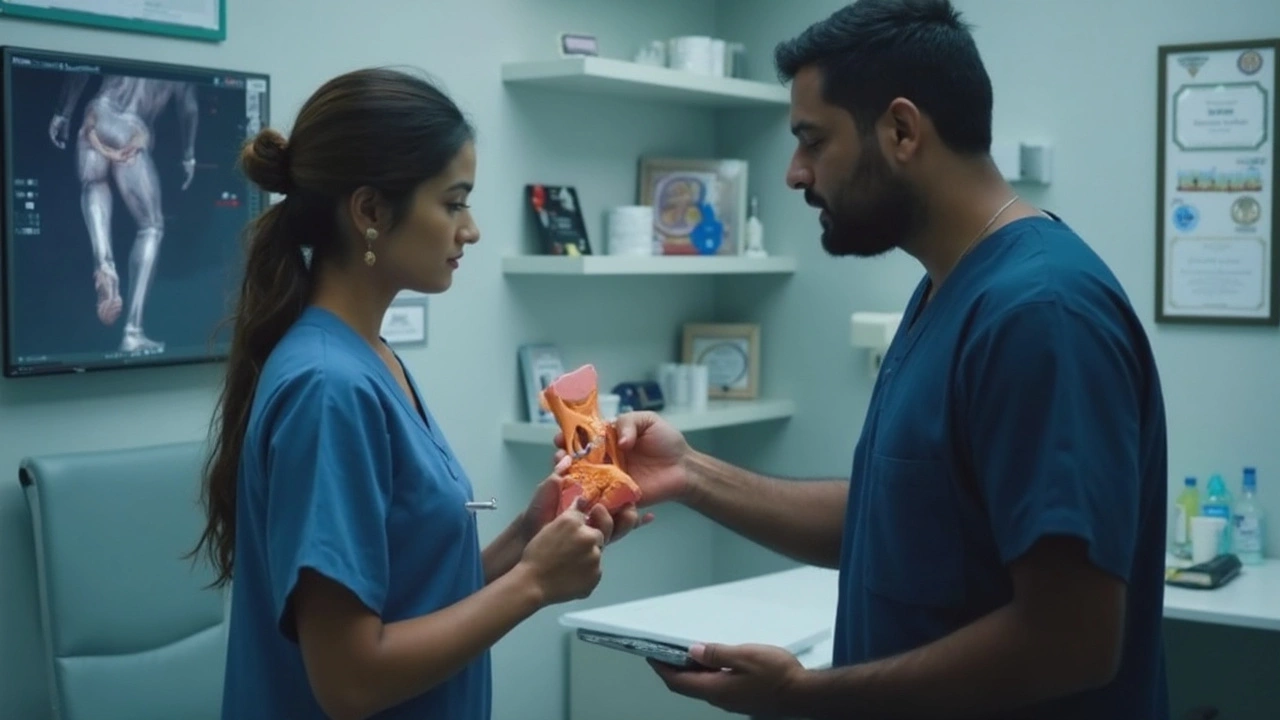Choosing a hospital for orthopedic surgery isn’t just about flashy brochures or big names. The difference between a smooth recovery and constant pain often starts with where you get your procedure done. Not all hospitals are built the same when it comes to orthopedic care—some are years ahead because they invest in skilled surgeons, high-tech operating rooms, and solid rehab support.
Ever noticed how some hospitals focus only on bones, joints, and muscles? That focus matters. Hospitals that specialize in orthopedics tend to have doctors who perform specific surgeries every single day. This translates to better results and fewer complications, especially for tricky procedures like knee replacements or spine surgeries.
A little-known tip: don’t just Google “best orthopedic hospital near me.” Dig deeper. Check out how many surgeries they do each year, and what their patient satisfaction rates are like. Hospitals with a ton of experience and high ratings usually have systems that keep mistakes rare—and those are the places you want on your radar.
- What Makes an Orthopedic Hospital Stand Out?
- Doctors, Equipment, and Support: Looking Closer
- Pro Tips and Mistakes Patients Make
- How to Pick Your Best Option
What Makes an Orthopedic Hospital Stand Out?
A great orthopedic hospital isn't just about the size of the building or fancy lobbies. What really sets a place apart is the combo of experienced surgeons, specialized teams, modern tech, and a proven track record. Hospitals like the Hospital for Special Surgery (HSS) in New York or Cleveland Clinic get top marks worldwide because they obsess over joint, bone, and muscle care.
It’s not just talk. HSS performs more than 35,000 surgical procedures a year, and their infection rates are among the lowest in the U.S. That level of focus means doctors get so good at their craft, they spot and fix problems others miss. You won't find generalists here—these are doctors who do hip and knee replacements daily, not once in a blue moon.
Look for an orthopedic hospital that offers:
- Board-certified surgeons with deep experience in your specific problem (like shoulders, knees, or spines)
- Advanced imaging and robotic surgical tools for accuracy
- Fast access to physical therapy and follow-up care in one place
- Real-time patient monitoring for safer surgery and recovery
Nerding out on stats helps too. Top hospitals proudly share patient satisfaction rates and surgery outcomes on their websites—if you don’t see those, be skeptical. Transparency signals confidence in their care.
"Consistent positive outcomes and high patient satisfaction are not by accident—they result from a team dedicated entirely to orthopedic care," says Dr. Thomas Sculco, surgeon at HSS.
The bottom line: A orthopedic hospital with a tight focus, top surgeons, and strong results should top your list when you’re picking where to go. This stuff isn’t marketing talk—it’s about your chance to walk, work, and live pain-free after surgery.
Doctors, Equipment, and Support: Looking Closer
The top orthopedic hospitals don’t just hire any doctors—they pick surgeons who do thousands of joint replacements, spine fixes, or fracture repairs every year. For example, according to U.S. News & World Report, hospitals like Mayo Clinic or Hospital for Special Surgery in New York lead the U.S. because their orthopedic surgeons collectively perform over 30,000 procedures yearly. That kind of volume means they’ve seen it all, from simple tears to complicated reconstructions.
But it’s not just about who holds the scalpel. The gear they use matters just as much. Modern operating rooms have robotic systems and real-time imaging. Hospitals with advanced tech can offer less invasive approaches, which means less pain and faster healing. A recent survey showed hospitals with robotic technology see complications drop by nearly 25% for knee replacements.
Rehab and support teams are the secret sauce. Even the world’s best surgery can fall flat if the aftercare is bad. Look for hospitals that have dedicated physical therapists, pain specialists, and even dieticians for orthopedic patients. The support you get right after surgery changes how fast you can get back to driving, walking, or playing sports.
Here’s a quick breakdown of what to look for in the orthopedic hospital you choose:
- Surgeons with high case numbers for your exact procedure
- Access to MRI, CT scan, and robotic surgical tools
- Full-time rehab staff and custom recovery plans
- Clear, simple ways to talk to your care team after surgery
Ever wondered how these hospitals stack up in numbers? Here’s a look at what top centers report:
| Hospital | Annual Ortho Surgeries | Robotic Surgery | Full-time Rehab |
|---|---|---|---|
| Mayo Clinic | 20,000+ | Yes | Yes |
| Hospital for Special Surgery | 30,000+ | Yes | Yes |
| AIIMS (Delhi) | 15,000+ | Partial | Yes |
So, don’t just focus on location or reputation. Dig into these details before you settle on where you’ll get your bones fixed.

Pro Tips and Mistakes Patients Make
Most folks think just picking the best-rated doctor will guarantee great results, but that’s not the whole story with orthopedic surgery. Sometimes, what you don’t know can actually mess up your recovery or set you back months.
- Best hospital for orthopedic surgery almost always means a place that handles hundreds—if not thousands—of surgeries a year. Experience matters. For example, hospitals that do over 100 joint replacements a year report around 30% fewer complications compared to low-volume centers.
- Don’t ignore the rehab department. Orthopedic success isn’t just about the surgery; it’s tied closely to physical therapy right after. Check if the hospital has on-site rehab and a good reputation for aftercare.
- Always ask about infection rates and readmission rates. Lower numbers here mean the hospital is serious about controlling risks and supporting you post-surgery.
- Double-check your insurance network. Even the best care can turn into a nightmare if insurance surprises you with a huge bill. Hospitals often work with different plans even if they’re in the same city.
Here’s a quick look at some numbers you want to know:
| Factor | Why it Matters | Data Example |
|---|---|---|
| Annual Surgeries (per hospital) | More means more skilled teams | 200+ hip/knee replacements = 15% lower revision rate |
| Infection Rate | Lower is safer for recovery | Top hospitals: <1% vs average 2-4% |
| Readmission Rate | Shows quality of post-op care | Under 5% is solid |
Now, let’s talk mistakes. People often don’t:
- Research the surgeon’s track record. There’s no harm in asking, “How many of these exact procedures have you done in the last year?”
- Think ahead to recovery. A hospital with a lousy discharge process can leave you stranded without support or clear instructions.
- Plan their ride home or help for the first week. Don’t get caught off guard—arrange a friend or family member in advance, especially if you’re not staying overnight.
Spend a little extra time on these steps and you’ll dodge a bunch of preventable headaches. The best hospitals have nothing to hide, so ask questions and compare real stats—not just shiny websites.
How to Pick Your Best Option
Figuring out the best hospital for orthopedic surgery doesn’t have to be confusing. The key is to look past what’s flashy and zero in on what actually affects outcomes—like doctor experience and hospital track record.
Start by checking the hospital’s stats. Hospitals that do hundreds or even thousands of orthopedic surgeries every year tend to have fewer problems and better results. The American Academy of Orthopaedic Surgeons recommends looking for facilities with high surgical volumes for the procedure you need, whether it’s a knee replacement, ACL repair, or spinal fusion.
What about ratings? Hospitals get graded all the time. U.S. News & World Report, Healthgrades, and The Joint Commission offer hospital rankings that focus on patient safety, success rates, and experience. High scores here usually mean a hospital is paying attention to quality.
Here’s a step-by-step guide to picking the right spot:
- Check if the surgeons are board-certified in orthopedics and have done your needed surgery a lot—don’t be shy about asking.
- Look for reviews or testimonials from real patients, especially those who had similar procedures.
- Call the hospital and ask about their infection rates after surgery; top hospitals track and share these numbers.
- Find out if they offer full rehab support after surgery. The best outcomes often come from places that coach you through recovery, not just the operation.
- Make sure your insurance is accepted and ask about out-of-pocket costs before booking anything.
One detail people often skip? Get a second opinion, even if the first doctor seems great. It’s normal and it can catch problems early or give you peace of mind. Orthopedic surgery isn’t something you want to rush into—get your facts, trust your gut, and pick a place known for actually getting people back on their feet.





